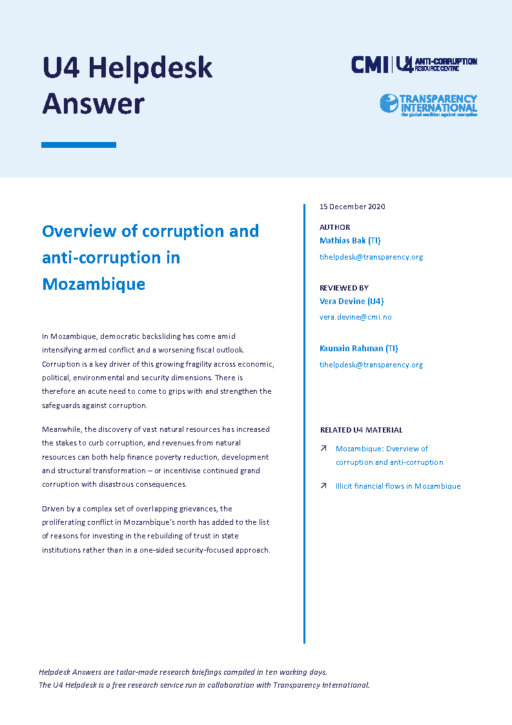
This Anti-Corruption Helpdesk brief was produced in response to a query from a U4 Partner Agency. The U4 Helpdesk is operated by Transparency International in collaboration with the U4 Anti-Corruption Resource Centre based at the Chr. Michelsen Institute.
Query
Please provide an updated overview of corruption and anti-corruption in Mozambique. We are interested in learning about: i) status and trends; ii) anti-corruption measures taken by the government and national institutions as well as applicable laws and other legal frameworks; iii) civil society organisations and other actors and their anti-corruption efforts; iv) what impact might measures of i and iii above have on corruption in Mozambique; v) economic and social implications, effects on the poor and conflict in the northern part of the country; and vi) land rights.
Summary
In Mozambique, democratic backsliding has come amid intensifying armed conflict and a worsening fiscal outlook. Corruption is a key driver of this growing fragility across economic, political, environmental and security dimensions. There is therefore an acute need to come to grips with and strengthen the safeguards against corruption. Meanwhile, the discovery of vast natural resources has increased the stakes to curb corruption, and revenues from natural resources can both help finance poverty reduction, development and structural transformation – or incentivise continued grand corruption with disastrous consequences. Driven by a complex set of overlapping grievances, the proliferating conflict in Mozambique’s north has added to the list of reasons for investing in the rebuilding of trust in state institutions rather than in a one-sided security-focused approach.
Contents
- Background
- Extent and forms of corruption
- Sectors vulnerable to corruption
- Legal and institutional framework for countering corruption
- Other stakeholders
- References
Main points
- Mozambique is experiencing the large costs of corruption to economic and political stability, prospects for sustainable development, poverty reduction and democratisation.
- The expectation of increased revenues from the extractive industries has heightened the corruption risks in a number of other sectors and has created new avenues for competition that could potentially undermine the drive to improve governance
- While there is an anti-corruption system in place, Mozambique’s anti-corruption framework does not currently form adequate safeguards against grand and bureaucratic corruption.
- Corruption, organised crime and governance issues, particularly in the security sector, land management, the justice sector and extractive industries, help reproduce the grievances that fuel conflict in Mozambique’s north.
Authors
Mathias Bak (TI), [email protected]
Reviewers
Vera Devine (U4), [email protected]
Kaunain Rahman (TI), [email protected]
Date
21/01/2021

